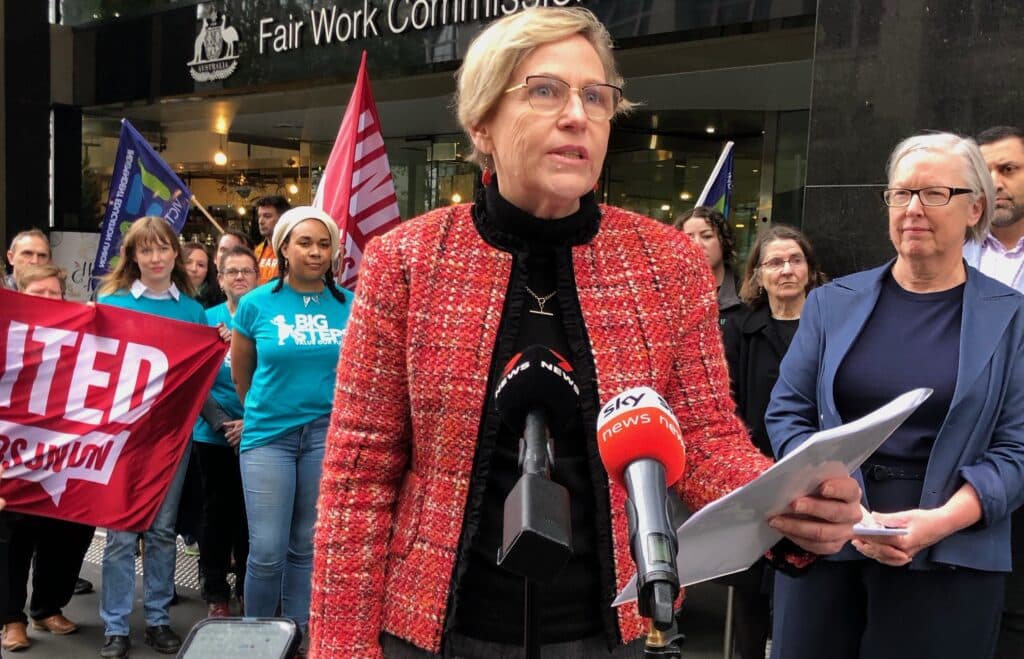Jim Chalmers’ Sunday blitz of pre-Budget interviews saw the Treasurer suggesting women would be the “big beneficiaries” of what’s handed down on Tuesday.
In addition to what we already know to expect from tomorrow—including tax cuts, funding for previously announced changes to paid parental leave to include superannuation payments, and the wiping of $3 billion in student university debt—Chalmers also signalled further funding to support pay increases across the aged care and early childhood educator sectors, which are heavily dominated by women.
Based on Chalmers’ interviews, below are the known highlights of the Treasurer’s “good for women” budget—more is likely to come once the official budget is shared on Tuesday (Women’s Agenda will be there, with a special edition Tuesday night).
First, the decision to pay superannuation on top of Commonwealth paid parental leave, which was announced around International Women’s Day this year. This is expected to cost around $623.1 million a year, higher than the initial estimates of around $200 million a year.
Then there is last week’s promise that $3 billion in university debts will be wiped, which the Treasurer described as “good for women”, as women are expected to account for around $1.75 billion of this.
There are also the reworked stage 3 tax cuts, with Chalmers saying the majority of the $107 billion in cuts announced will flow through to low and middle-income earners, where women are overrepresented. Chalmers said 90 per cent of women will benefit from a bigger tax cut when the changes kick in from July this year.
With Australians desperate for more cost-of-living relief, Chalmers described the tax cuts as being the “foundation stone” of such relief while indicating more measures are still coming. These measures won’t be identical to what’s been slated in the past, “but it will be substantial,” he told Sky News.
As for addressing the gender pay gap and underpaid care sectors, the Treasurer earmarked a “multibillion-dollar provision towards wage increases” for such workers.
The majority of this looks set to flow through to aged care workers. It is a measure required from the Government as part of a Fair Work Commission decision to meet the second aspect of the total 28 per cent pay rise granted to aged care workers. This year’s spending will follow the first stage of these pay increases being previously allocated (costing $14.1 billion over four years).
The early childhood education sector currently has its own claim before the Fair Work Commission for a similar pay increase for workers, and both the Treasurer and Prime Minister have indicated they are preparing for it.
“The Albanese government is committed to ensuring Australians doing these vital jobs get the pay they deserve,” Chalmers said.
Prime Mininster Anthony Albanese signalled a “substantial” aged care wage increase during a press conference last week, adding that “we’re looking, of course, at early educators as well.”
The childcare sector and peak bodies negotiating the historic deal for small and community early educator providers have welcomed the Treasurer’s comments on what’s coming tomorrow, describing it as “critical progress towards delivering professional pay without increasing out-of-pocket costs for families.”
Julie Price, Executive Director of Community Child Care, said that the yet-to-be-finalised multi-employer bargaining delegation is a process bringing together the sector to solve decades of pay inequity.
“We haven’t wasted a second since these new laws passed,” she said referring to legislated changes making such bargaining possible for the first time. “We are excited that educators and teachers will soon see the benefit, and more children will be able to access high-quality education and care.
Michele Carnegie, CEO of Community Early Learning Australia, also described the funding commitment as a “game changer” for the long-day care sector. “We look forward to finalising the new multi-employer agreement so small and community providers can attract the qualified staff they need.”
Meanwhile, domestic and family violence advocates are also hoping and expecting to see more allocated around addressing the current national “crisis” of violence against women, as the Prime Mininster has previously described it. Following the recent National Cabinet, we can expect to see $930 million allocated over four years to extend the Leaving Violence payments program. But given the crisis we’re confronting, much more will be needed — including around affordable housing — to ensure this truly is a budget for women.
Pictured above: Julie Price at the commencement of multi-employer bargaining negotiations for early childhood educators.


